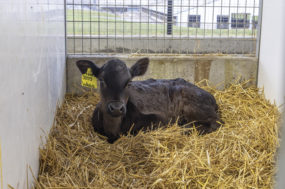It wasn’t what I expected him to say. About 16 years ago, I was working for a community newspaper and interviewing a couple that had been married for 75 years. I can no longer remember their names, but they changed the way I approached life on a family-owned dairy farm.

I was about to be married and asked this beautiful couple for advice. They were both well into their 90s and had raised kids and sugar beets on a family farm near Jerome, Idaho.
“You’re marrying into that big dairy family, aren’t you?” the man asked.
“Yes.”
“Stay the hell out of the family business.”
I was stunned. It wasn’t at all what I expected him to say. Aren’t you supposed to join the family business? This kind, gentle man had been married for 75 years. If my marriage lasted as long as his, I wanted my husband to still look at me the way he looked at his wife. Maybe he was on to something.
At the time, my fiancé and I had already talked about this issue. He and his brothers feared that if a divorce ever happened, someone from outside the family would end up owning what they had spent a lifetime building. I was OK with keeping my legal distance from the farm, but part of me wanted to have a more active role.
Over the years, I’ve felt left out. I am the only wife that does not work for the dairy. Every time I have tried, it has ended in disaster and hurt feelings. I certainly help when asked. I do things like set up fair booths to promote our dairy and the industry. I give tours. I attend chamber meetings and represent the dairy within the community.
Over these relatively few years, my relationship with my husband and his family has become comfortable. I’ve made all sorts of mistakes. There have been tears and frustration – but more and more there is laughter and acceptance. I love the life I lead and the dairy that makes it possible. It’s been nowhere near easy. There have been times when I’ve wanted to run away and never come back.
But it was at those times that I learned the most. Here’s a top six.
1. Be true to yourself. I was trying to change my personality to fit in. No one asked me to do that. (OK, my husband did ask me to cut back on the sarcasm. Yeah, I’ll do that.)
2. Set boundaries. A huge fight once started because some of my in-laws disagreed with how I fed my toddler. (I gave her clam chowder.) In general, what goes on in my house, with my children, in my world, is no body else’s business.
3. Grow up and get over yourself. It’s hardly ever personal. If your brother-in-law bit your head off, it’s more than likely because he’s trying to figure out how to feed 1,000 cows on $2.25 rather than because you asked him if he wants ham or beef at Thanksgiving dinner.
4. Business is business. Everything else is everything else. Make sure the farm business plan, buy-sell agreements and estate plans are in place. Make them clear. Review them every year. If something horrid happens, like a death, or frustrating, like a divorce, know in advance who gets what and why. This process will be wretched. Heart-wrenching. Worth it.
5. Get your own life. Have a hobby, friends and activities outside the dairy. I do a few things socially with my in-laws and enjoy their company. I love them and they’ve always “been there” for me. However, I have my own group of friends and interests.
6. Finally – and this is the hardest one of all – accept that sometimes you’re going to lose. There are just days when blood is thicker than the wedding ring. I don’t like it, but I love my husband. He has to choose between his bloodline and his wife, which is a difficult choice for anyone. After a lot of tears I have learned to choose my battles.
The bottom line in this: At first glance, you don’t even make it on his top three priorities. There are his cows, his dog, his truck … If you’re lucky you fit in somewhere between his favorite hat and his fishing pole.
In my heart I know that for every dinner he’s missed, for every recital to which he’s arrived late – for every time he’s gone to the neighbor’s house “just to check out the new workin’ chute” and not come for hours – in his heart everything he does on and for this dairy is for the kids and me. In his soul, we are first. Most dairy farmers I know are the same.
My in-laws sometimes call me a rebel. I used to feel bad because I didn’t fit in. Those days are over. I like who I am. I like who my family is. I love this dairy – these cows – and that’s all that should matter. PD

-
Karma Metzler Fitzgerald
- Dairywoman
- Shoshone, ID



